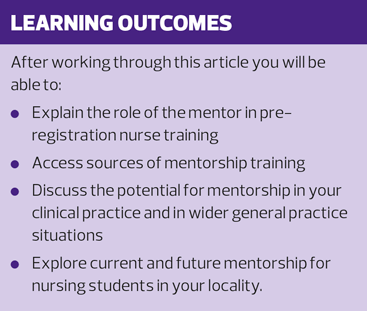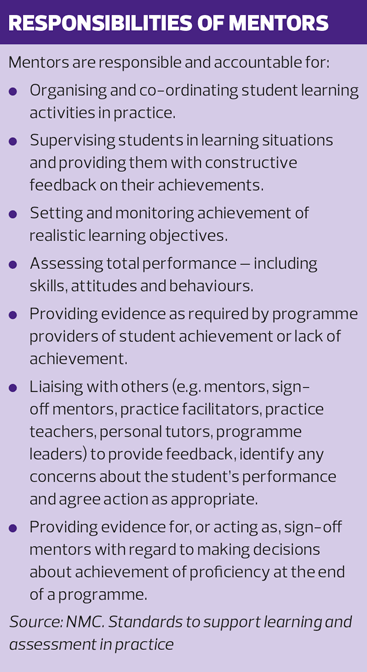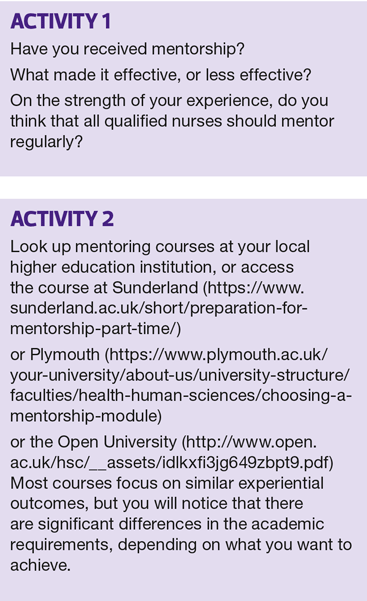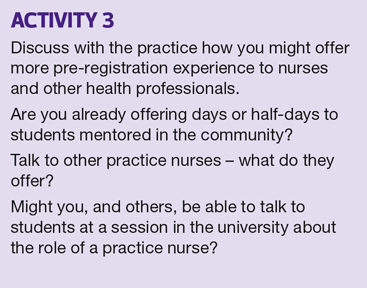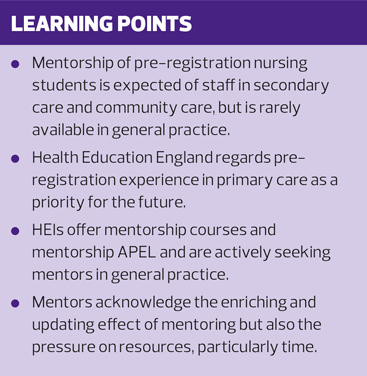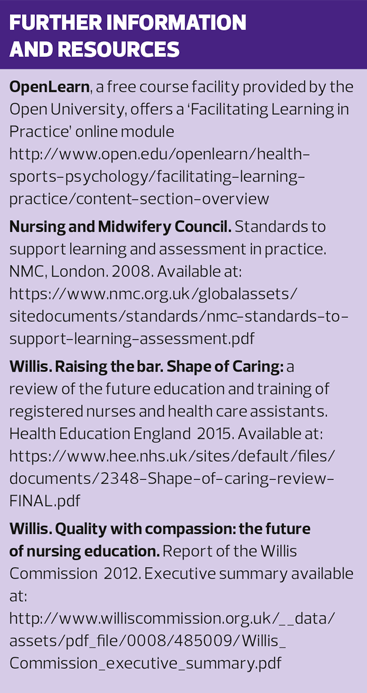Mentorship: the way forward?
LIZ BRYANT
LIZ BRYANT
BSc Hon, NP, MMedEd
Nurse practitioner in general practice, Regional Trainer for Education for Health, Practice Tutor for pre-registration training at the Open University
How will general practice encourage new nurses into primary care without placements for pre-registration and newly qualified nurses? And if placements are created, who will mentor the students and how will those mentors be supported? Read on to explore the potential, and pitfalls, of nurse mentorship
It is easy to lose touch with other strands of our profession. Reflect, for example, on how many branches of nursing do not have a clear picture of what is involved in practice nursing. (For an introduction for would-be general practice nurses, look at the article by Lucy Archer in the January edition of Practice Nurse.1)
How much do you know about current pre-registration nurse education? Who supports student nurses on the practical placements that form 50% of their time commitment? Who assesses their competence in nursing skills, and signs them off as proficient and able to be entered onto the register? Nurse mentors, and sign-off mentors, are responsible for assessing the nursing force of the future, and there are not nearly enough of them, particularly in primary care.
CURRENT STANDARDS AND GUIDELINES
The Nursing and Midwifery Council (NMC) set out and clarified new standards in 2008 which govern current education structures in nursing,2 and the role of mentor. In clinical placements the student nurse must be allocated a named mentor for one-to-one support. The mentor is to establish effective working relationships, facilitate learning and foster professionalism, as well as being accountable for assessing the competence of the developing nurse. A sign-off mentor, responsible for confirming the proficiency of a nurse before she/he is added to the register, has additional training and supervision before fully assuming that role.
The weight of the responsibility is spelt out in the document:2 ‘Mentors, practice teachers and teachers who sign off all, or part of the practice component of a programme leading to registration are accountable to the Council for their decisions. Confirmation by the mentor or practice teacher that the student is capable of safe and effective practice will be considered by the assessment board along with other assessed outcomes to determine whether the student has met all requirements for successful programme completion.’
At the moment many trusts expect the qualified nurse to be used as a mentor, as an expression of the part of the NMC Code Standard 9.4,3 which reads: ‘…you must….support students’ and colleagues’ learning to help them develop their professional competence and confidence’ and point out that learning can be enhanced and updated by being a teacher.’
However, other trusts and educators argue that mentorship is a skill that needs careful nurturing, and is likely to be poorly delivered by a nurse who has little natural aptitude and has had it thrust upon her. (See Activity 1)
The Raise the Bar review,4 suggests that there is an expectation for the post holder to mentor student nurses within most job descriptions for qualified nurses, but that it can be seen as ‘poisoned chalice’ with no time allowed to do it well and insufficient funds to support either training or practice.
Interestingly Willis also reports: ‘The degree to which the mentor and the practice environment value learning appears to impact significantly upon student outcomes, both in terms of learning and the desire to complete the course’.4
MENTORSHIP TRAINING
Many universities offer ‘preparation for mentorship’ courses, which can be – and often are – undertaken in or soon after the first year after registration, as part of preceptorship. However, they are available for any registered nurse or midwife who would like to develop the skills. The course is likely to run for about 13 weeks, with 4–5 days in attendance at the university, with most of the learning being work-based. To complete such a course you need a pre-registration student whom you mentor for a placement, with the support of an experienced mentor. (See Activity 2)
Many nurses completed English Nursing Board certificates to support their teaching of students in the past. These do not automatically meet the NMC Standards for Teaching and Learning,2 but there are ways to achieve Accreditation of Prior Experiential Learning (APEL) for previous teaching and mentoring experiences and training. Contact your local higher nursing education provider or the NMC for more information.
So what is the need for good mentorship, and why might you want to get involved?
IS MENTORSHIP FOR ME?
Hopefully, yes! Primary care is uniquely placed to offer high quality student experience, not least because of the greater possibility of planning protected time for support and reflection. Students from secondary care comment frequently on the team support in general practice and community nursing, and the shared discussions over clinical issues. In the community students can accompany different members of the team to encompass a wide variety of experiences, and then return to reflect with the mentor and others; this does happen in general practice too, but much less because there are far fewer nurse mentors in general practice.
In Raising the Bar,4 Health Education England states: ’There needs to be more emphasis on providing students with community places, including placements within the independent sector, and particularly in general practice. Solutions are needed to remove barriers, ensuring that a fully trained and proficient out-of-hospital nursing workforce is developed for the future.’
The review proposes pre-registration nursing focusing on the whole person – physical and mental – for two years, as a core programme for nurses aiming for any field (mental, adult, child or learning disability).4 In the third year, the student would opt to specialise in one of the four fields or a newly suggested field, that of community nursing. The fourth year would be one of preceptorship, as now.
In this way, it is suggested, mental health would not be divorced from physical health, and the nursing workforce would be better equipped to meet the huge increase of nursing requirements outside secondary care. General practice might also note that newly registered nurses will come to practice nursing with the likelihood of having some previous experience of the role.
However, there are significant steps to be taken before the proposal can be realised, not least the development and support of mentors in general practice. How can general practice be engaged, and encouraged to take it seriously? How can CCGs promote and nurture a culture of ‘growing practice nursing’? How might current GPN nurses be enabled to become nurse educators, and practices become placements for pre-registration nurses?
BUT IS MENTORSHIP REALLY FOR ME?
’Great opportunity to reflect on your own practice with students present, and makes you question why you are teaching them this way. Is it still up to date or is it one of those things where you have been told/taught a certain thing but have no idea where this came from and are unable to back this up?
‘Working solo most of the time, have you slipped into bad habits?’ (Current practice nurse mentor)
There are already some practice nurses mentoring pre-registration students. Some have offered a day or a week in a community placement, and have come to a local arrangement with the education provider,6 such as the University of Hereford, and there are clearly plans to develop this approach further.
Other practice nurses have been enlisted to mentor their own health care assistant as he or she studies the Open University BSc in Adult Nursing (http://www.open.ac.uk/courses/qualifications/q73), a part-time course built around someone already employed as a HCA/nursing assistant. The ‘base placement’ must provide a mentor who is on the same part of the register and who has completed, or agrees to complete, the mentor training. The student works for 2 days a week as a student during placements, and must spend 40% of that time with a mentor. Several of those placements will be in the base placement and therefore with the practice nurse mentor. In addition, general practice nurses who have trained as mentors are able to take students from secondary care for their community placement.
Mentors are supported and updated by the higher education provider. Their supervision of the student nurse becomes less direct as the student progresses, and by the third year it is expected that the student will be running their own clinics adjacent to that of the mentor. Practices that are supporting these students will be investing time and expertise (particularly in the first two years) but will benefit from extra nursing resource as the degree nears completion, and a ‘home-grown’ registered nurse who requires no induction before assuming the general practice nurse role.
In the first year, the student nurse works very closely with the mentor or other qualified clinicians, observing and contributing to clinical care, but under direct supervision. The mentor will create opportunities for learning and reflection, enabling the student to witness the patient journey, clinical decision-making and evidence-based care in as wide a range of situations as possible. She will also be assessing achievement of competencies at increasing depth as the course progresses, guided by the educating body and a detailed portfolio.
The time commitment – during, for example, a six-week placement of two days a week – might be one day of the student working with the mentor, with perhaps 30 minutes for discussion and reflection within that, and another 30 minutes for the student to discuss their participation in other clinics/visits on the other day. The mentor would be expected to attend a ‘mentor update’ at least once a year, and would have a link to a tutor at the higher education provider.
One mentor remarked ‘I knew she would make a brilliant nurse as I watched her in her HCA role’, and has expressed her excitement as she observes competencies develop. She has also been very aware of challenges to the relationship. It is difficult to get the right balance when someone who is a friend becomes a pupil and may need re-direction, or to be told that they have not achieved to the required level.
If you are intrigued, look at the mentor self-selection tool developed by the University of Southampton (www.valuesbasedmentorship.co.uk) and see where that might take you.
IS ONE-TO-ONE MENTORSHIP THE WAY FORWARD?
Because of the quantity of people training to be nurses, there are huge pressures on placements and mentors. Other ways of supporting students are being actively investigated, including the Collaborative Learning in Practice model being trialled in the East of England,6 where ‘coaches’ are used to support no more than three nurses who have allocated patients for the whole shift, and there is protected time for the mentor-student meeting each week.
However, contributors to the Royal College of Nursing’s mentorship project,7 suggested that much could be done to improve the current system, without totally replacing it, as long as practice-based nurse education was given recognition and endorsement from nurse leaders and management boards, so that adequate resources were available to fully support it. Practice Placement Facilitators, who work for the trust but arrange placements for the higher education institute (HEI) that has the student nurses and midwives, will talk about the value of mentoring for the trust as well as the students, the commitment to high standards, and the worthwhile investment from good mentors on the ward and in the community. They will also talk about the strain on time and resources that the relentless demand for placements can make in a busy hospital. The nurse managers and CCG/trust boards who participate in agreements with HEIs need to be committed to high quality education, and its implications for staffing and support at practice level.
Mentoring nursing students will not generate much income for the practice – at the moment medical students bring significantly more money with them – but remuneration is currently under discussion as part of a wider exploration of placement provision. Health Education North East, for example, is proposing a series of Community Education Provider Networks, where a hub co-ordinates placements for a range of clinical students, including pharmacists and nurses, physician associates and paramedics from providers aligned to the network, and where the network can support mentorship training, innovative clinical education and recruitment and retention of high quality primary trained staff. CCGs are being challenged to make a bid. (See Activity 3)
CONCLUSION
Mentoring is not for everyone, but there is a great deal of untapped potential in general practice that must be engaged if we are to have a primary care service that can deliver high quality and continually improving care. Mentoring hones clinical skills, adds depth to communications, and opens up opportunities to re-explore the evidence base – and that is just for the mentor! Student nurses need to know how to nurse in primary care, and who, if not you, will be there to support them as they discover?
REFERENCES
1. Archer L. Making the transition into general practice nursing. Practice Nurse January 2017;47(01):8-11
2. Nursing and Midwifery Council. Standards to support learning and assessment in practice. NMC, London. 2008.
3. Nursing and Midwifery Council. The Code: professional standards of practice and behaviour for nurses and midwives. NMC, London. 2015
4. Willis. Raising the bar. Shape of Caring: a review of the future education and training of registered nurses and health care assistants. Health Education England 2015.
5. Whayman K, Quinlivan L. Student Nursing Placements in General Practice: The UH Experience. University of Herefordshire. https://www2.rcn.org.uk/__data/assets/pdf_file/0019/616015/2.2.2-Whayman.pdf
6. University of East Anglia. Collaborative Learning in Practice. https://www.uea.ac.uk/health-sciences/enterprise/collaborative-learning-in-partnership-clip
7. Royal College of Nursing. RCN Mentorship project 2015: from today’s support in practice to tomorrow’s vision for excellence https://www.rcn.org.uk/professional-development/publications/pub-005454
Related articles
View all Articles
